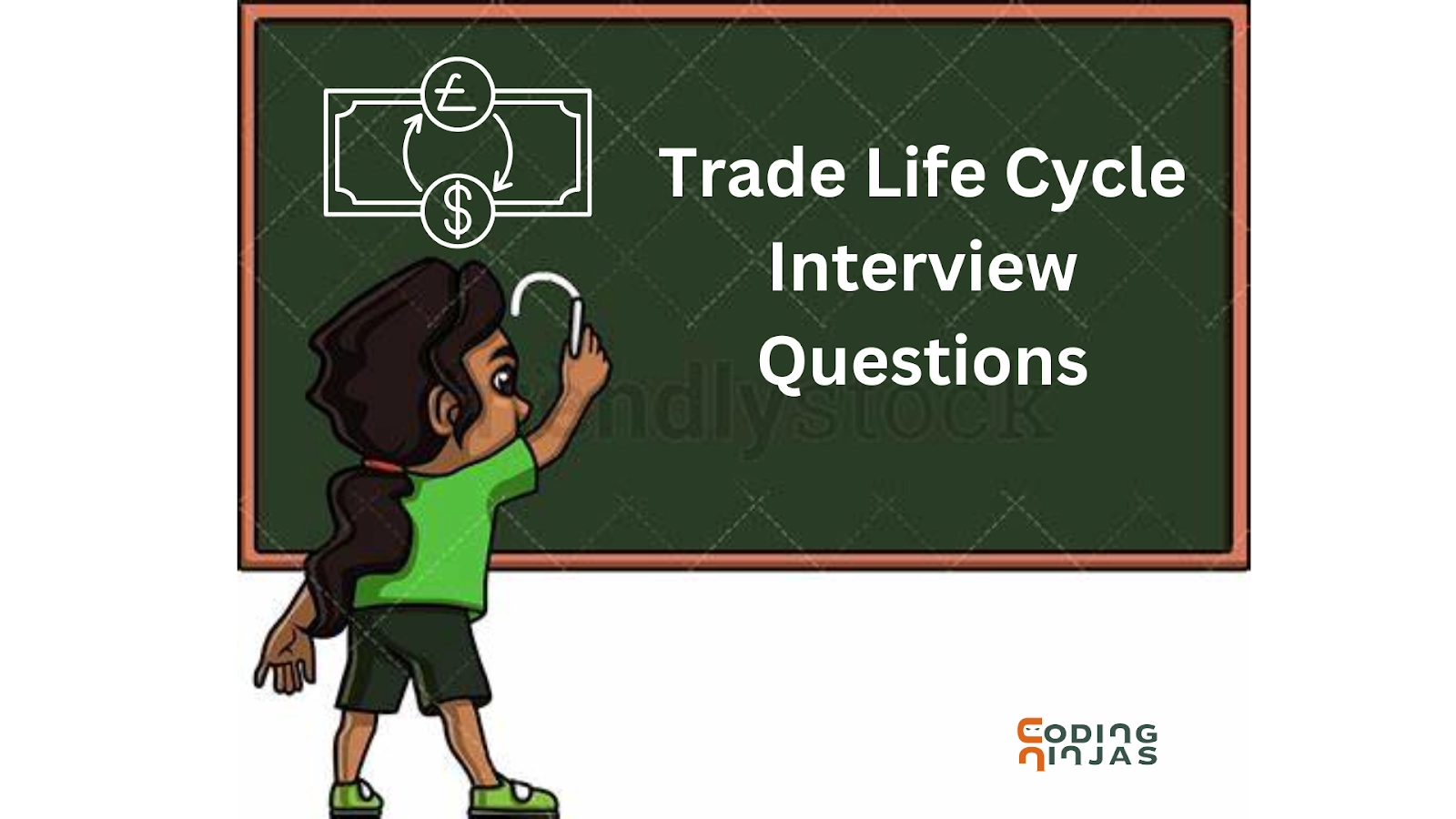Have you ever thought about what happens when a trade is initiated, that is, when you put an order to sell or buy some stocks or shares in the stock market?
Like any other business, this trade also has its life cycle that describes the various stages of making a successful trade.

This quick guide on Trade Life Cycle Interview Questions will help a lot if you prepare for an interview regarding the same in the future. This article consists of the 30 most popular Trade Life Cycle Interview Questions, so let’s get started without wasting time.

Easy Level Questions
1. What is equity? State the two types of orders that are issued.
Ans: Equity is the term used to describe the shareholders’ stake in the company. Equity is a company's total assets minus its total liabilities.
The two types of orders that are issued in equity trading are:
- Buy Orders
- Sell Orders
2. Define Equity Funding.
Ans: Equity Funding refers to the insurance policy paid for by a mutual fund. The cost of the mutual fund shares is used to pay the insurance policy premiums.
This enables individual investors to gain and benefit from a traditional mutual fund investment.
3. Do you have an idea of private equity transactions?
Ans: The private equity transactions are investments by private equity firms in particular target companies.
A target company is a such enterprise that has the potential to perform in a short duration of time.
4. Explain the term ‘Over the Counter Market’.
Ans: ‘Over the Counter Market’ is a term used to describe a decentralized market with no physical location. In this market, traders or participants trade with each other using various communication modes, such as telephone, e-mail, and proprietary electronic trading systems.
5. What charges are payable while purchasing a stock?
Ans: The charges payable while purchasing a stock are listed below.
- Stock Brokers
- Commission
- Stamp duty
- Cost of the stock
6. State the different types of Equity Market.
Ans: The different types of Equity Market that exist are listed below.
- Public Issue
- Right Issue
- Private Placements
- Preferential Allotment
7. Describe EuroDollar.
Ans: EuroDollar is the term used to refer to US dollar deposits at foreign banks or foreign branches of American banks. The orders are regular but outside the US banking system.
8. Briefly describe Option Trading.
Ans: In Option Trading, a contract is signed between the seller and buyer. An individual can transact one or more assets at a fixed price before the contract's expiry date. This fixed price was decided while the contract was being made.
9. Do you understand the terms ‘Dovish’ and ‘Hawkish’?
Ans:
🔥 Dovish
Dovish is an inflation attribute of an investor who favors lower interest rates.
🔥 Hawkish
Hawkish is an inflation attribute of an investor who favors higher interest rates.
10. What do you understand by MF?
Ans: MF stands for Minimum Fill Order. It is a type of attribute attached to an order. It determines the number of shares that has to be available for an order to be triggered.
Medium Level Questions
11. What is the Debt-to-Equity Ratio?
Ans: The Debt or Equity Ratio is used to calculate the debt against equity. This determines the portions of the company’s finance to be used for the company’s various purposes. It is used as a standard identification to judge any company’s financial stability.
12. What are derivatives? What are its various types?
Ans: A specialized contract made to buy or sell the underlying assets for a particular period in the future at a price determined before is known as a derivative.
Derivatives are of three types.
- Future or forward contract
- Options
- Swaps
13. Explain the difference between Realised and Unrealised Profit.
Ans:
🔥 Realised Profit
The profit comes from completed trade, that is, the trade whose transactions have been executed completely.
🔥 Unrealised Profit
The visual profit would have been made or will be made if trades were executed.
14. What does an Equity Analyst do?
Ans: The work done by Equity Analysts includes researching and analyzing financial data and trends for a company or firm. They write reports on company finances and assign financial ratings. They also help the company to overcome financial crises by suggesting ways to get out of debt.
15. Briefly describe preference shares.
Ans: A preference is a share that enables an individual to claim a stake in the company with one condition. The condition is such that whenever the company liquefies or decides to pay a dividend, the preference shares holder will be among the first set of shareholders to get paid after the company has cleared its debt.
16. Do you have any idea about ROE?
Ans: ROE stands for Return Of Equity. It is a profit measure that calculates the profit a company generates with each shareholder’s equity.
The formula to calculate ROE is mentioned below.
ROE = Net Income/ Shareholder Equity
17. Explain the Hedge Ratio.
Ans: The Hedge Ratio must be known to an individual when he is trying to hedge a position in the market.
Hedge Ratio = volatility in position/volatility of hedging instrument
There are two other factors on which the Hedge Ratio depends. These conversion factors can be used for deliverable bonds and modified duration.
18. What can lead to assets turning into private equity?
Ans: The reasons which can lead to assets turning into private equity are stated below.
- Raising Capital
- Increasing Regulation of Public Markets
- Effect of Public Markets
- Financing the Private Equity firms
19. What role does earning potential play while judging a stock?
Ans: Earning Potential of a stock is used to judge the stock price. By looking at the stock price externally, you cannot say that the stock is cheap or expensive. A $100 stock can be cheap if the company’s earnings prospects are high enough, while a $20 stock can be expensive if earning potential is low. The P/E ratio is the correct judge of the valuation of the stock.
20. State a few examples of popular Hedge Fund Strategies.
Ans: A few examples of popular Hedge Fund Strategies are listed below.
- Long Only
- Relative Value
- Convertible Arbitrage
- Risk Arbitrage
- Macro - stocks, bonds, currencies, commodities
- Distressed
- Event Driven
- Emerging Markets





